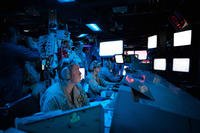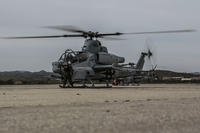Twelve U.S. Air Force F-15 fighters sent to Incirlik airbase only last month to guard Turkish airspace and hit ISIS targets in Syria were suddenly flown back Wednesday to their home base in Britain, U.S. European Command announced.
Pentagon officials were quick to dismiss suggestions that the removal of the F-15s was related to ongoing tensions between Moscow and Ankara, or the U.S. effort to enlist Russia's support for a political settlement in Syria.
"I wouldn't read that into it, no," said Capt. Jeff Davis, a Pentagon spokesman. The F-15s were "expeditionary" and "this was never intended to be an open-ended, in perpetuity deployment," Davis said.
The redeployment of the fighters came amid a flurry of diplomatic and military-to-military activity in the region and with Russia on the campaign against the Islamic State of Iraq and Syria.
A day before the planes left, Secretary of State John Kerry was in Moscow for talks with Russian President Vladimir Putin ahead of United Nations Security Council meetings in New York Friday on Syria and U.S. efforts to ease out President Bashar al-Assad.
The fighters -- six F-15C air-to-air combat jets and six F-15E Strike Eagles -- began leaving a day after Defense Secretary Ashton Carter was at Incirlik on a USO holiday tour and met with Turkish officials on the side.
Carter did not meet with his counterpart, Defense Minister Ismet Yilmaz, Davis said. The removal of the F-15s had been worked out with Turkish officials earlier and their departure shortly after Carter's visit was a "coincidence," Davis said.
Pentagon officials also confirmed that the jets departed a day after Joint Chiefs Chairman Gen. Joseph Dunford conferred by phone with his Russian counterpart, chief of staff Valery Gerasimov, on the air campaigns being conducted by the U.S. and Russia in Syria.
It was the second time in two weeks that Dunford had spoken with Gerasimov, the officials said. Dunford and Gerasimov "exchanged views on the situation in Syria and the practical aspects of cooperation between the Russian Aerospace forces and the coalition, led by the United States, in the fight against" ISIS, the Russian Defense Ministry said in a statement.
At the Pentagon, Davis said the vast majority of Russian airstrikes were still focusing on rebel groups opposed to Assad rather than on ISIS. He said the Dunford-Gerasimov talks were unrelated to the shootdown of a Russian warplane by a Turkish F-16 last month. "We've said from the beginning that what happened with the shootdown was a matter between Turkey and Russia," Davis said.
The F-15s that flew out of Incirlik Wednesday had replaced six F-16s from the 31st Fighter Wing at the Aviano Air Base in Italy, which arrived at Incirlik on Aug. 9 following Turkey's agreement to allow the U.S. to conduct strikes against ISIS from Incirlik, about 70 miles from the Syrian border.
Six F-15Cs landed at Incirlik on Nov. 6 in a pointed signal to Moscow that the U.S. was prepared to assist Turkey in guarding its airspace against Russian incursions. The six F-15E Strike Eagles arrived a week later to much fanfare from the U.S. military about how their presence would allow for more loiter time over ISIS targets in Syria.
The redeployment of the F-15s to their home base with the 48th Fighter Wing at Royal Air Force base Lakenheath in Britain will leave Incirlik with 12 A-10 Thunderbolt attack aircraft and an array of armed drones.
Davis said U.S. and coalition airpower in the region was being enhanced despite the departure of the F-15s. The aircraft carrier Harry S Truman was currently transiting the Suez Canal to go on station in the region with more than 50 strike warplanes aboard. The Truman will be joining French carrier Charles De Gaulle which will also be on station in the Gulf.
Davis also noted that German reconnaissance aircraft would soon be based at Incirlik and other coalition partner aircraft were considering putting strike aircraft at Incirlik.
In addition, British aircraft were now conducting strikes in Shyria from Cyprus while French aircraft were flying from Jordan.
"I think we've demonstrated our commitment as Turkey's ally towards its air sovereignty and the fact that we can and will if needed very quickly deploy those forces back if there's a need to do so," Davis said.
The U.S. and Germany said similar things last summer about the ability to redeploy quickly when both nations withdrew Patriot anti-missile batteries from Turkey.
-- Richard Sisk can be reached at richard.sisk@military.com




























